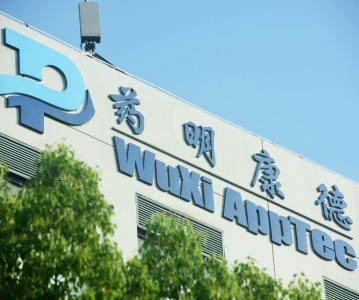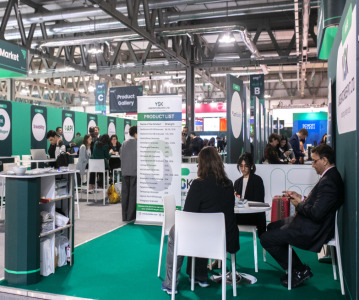Sartorius Stedim BioOutsource introduces new Released N-Glycan Assay

Sartorius Stedim BioOutsource facilities in Glasgow where the new released N-Glycan assay has been developed for in-depth profiling of IgG glycosylation.
In-depth profiling of IgG glycosylation coupled with ADCC assays enables generation of robust biosimilar comparability data.
Sartorius Stedim Biotech (SSB) has launcheda new Released N-Glycan Assay for the in-depth profiling of IgG glycosylation. This new physico-chemical assay, developed by SSB’s subsidiary BioOutsource and offered in combination with its unique Antibody Dependent Cell Cytotoxicity (ADCC) assay platform, combines data on the molecular structure with a key therapeutic mechanism of action. This will generate comprehensive, highly accurate biosimilar comparability data, driving shorter drug development timelines.
The new N-Glycan Assay is one of a range of orthogonal methods, including analysis by CD16a (FcγRIIIa) and SPR binding, as well as ADCC functional assays that BioOutsource offers to provide a detailed testing package to generate evidence suitable for regulatory submissions.
BioOutsource’s new assay involves enzymatically-removing glycans from the antibody, functionally derivatizing them and separating the glycans by UHPLC. The glycans are then identified by on-line electrospray ionization mass spectrometry (ESI-MS), enabling confident assignment and precise quantification of the different structures.
Dr Daniel Galbraith, Chief Scientific Officer at Sartorius Stedim BioOutsource, explained: “The structural classification and monosaccharide composition of carbohydrates attached to the constant region of therapeutic biosimilar antibodies is key to their binding. An accurate understanding of these glycans ensures effective selection of biosimilars that have the optimum ADCC activity to destroy tumour cells.”
Galbraith continued: “Our new Released N-Glycan Assay coupled with our ADCC assays will help deliver this understanding by providing robust biosimilar characterization data suitable for the regulators, thus enabling efficient drug development and more rapid entry into clinical programs.”
Related News
-
News WuXi to sell CGT manufacturing unit to US-based Altaris LLC
At the tail end of 2024, Chinese-based CDMO WuXi AppTec announced the signing of their deal with private equity firm Altaris LLC, confirming the sale of WuXi Advanced Therapies, the cell and gene therapy manufacturing arm of WuXi AppTec. -
News Women in Pharma: Our hopes for 2025 and beyond
Our last instalment for 2024 of the Women in Pharma series brings you messages direct from the Informa Markets CPHI team as they discuss the advice and insights they have carried throughout their roles working at CPHI, and what they hope to see for the... -
News CPHI Milan Wrap-Up Report: Conference Highlights
Discover the emerging and trending topics of the pharmaceutical industry with our CPHI Milan Conference Highlights, with exclusive insight from pharmaceutical leaders and experts! -
News BIOSECURE Act not included in key defense spending bill for 2025
On December 7, 2024, the Biden administration revealed the 2025 National Defense Authorization Act, an annual defense bill specifying the budget and expenditures of the US Department of Defense. The controversial BIOSECURE Act was notably missing from ... -
News Lessons from CPHI Milan 2024: Sunny Intervals for Pharma Manufacturing?
As the 2024 CPHI conference wrapped up in Milan, we caught up with L.E.K. Consulting – a global strategy consulting firm with deep expertise in pharma manufacturing – to discuss evolving market perspectives and business outlook. -
News Trump 2.0: What does the US election result mean for the healthcare industry?
After Trump won the Presidential election in the US in early November, we take a look at some of the implications a new Trump administration could have on the health and pharmaceutical industry, and on US patients. -
News Women in Pharma: Reflections from Behind the Scenes
In this instalment of our monthly series, the team that brings you the Women in Pharma series each month sits down for a heart-to-heart on what the series means to them, and how they hope to continue their work in the future. -
News Scaling the Industry: CPHI Scale-Up Market interview with YSK Laboratories
For the first time, CPHI Milan hosted the CPHI Start-Up Market, expanding support for emerging and small-sized enterprises in their transition to the next level of growth. In this interview, we spoke with Yuvansh Khokhani, Managing Director of YSK Labo...
Position your company at the heart of the global Pharma industry with a CPHI Online membership
-
Your products and solutions visible to thousands of visitors within the largest Pharma marketplace
-
Generate high-quality, engaged leads for your business, all year round
-
Promote your business as the industry’s thought-leader by hosting your reports, brochures and videos within your profile
-
Your company’s profile boosted at all participating CPHI events
-
An easy-to-use platform with a detailed dashboard showing your leads and performance

.png)





